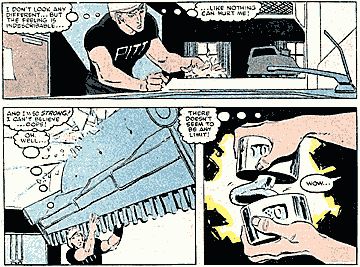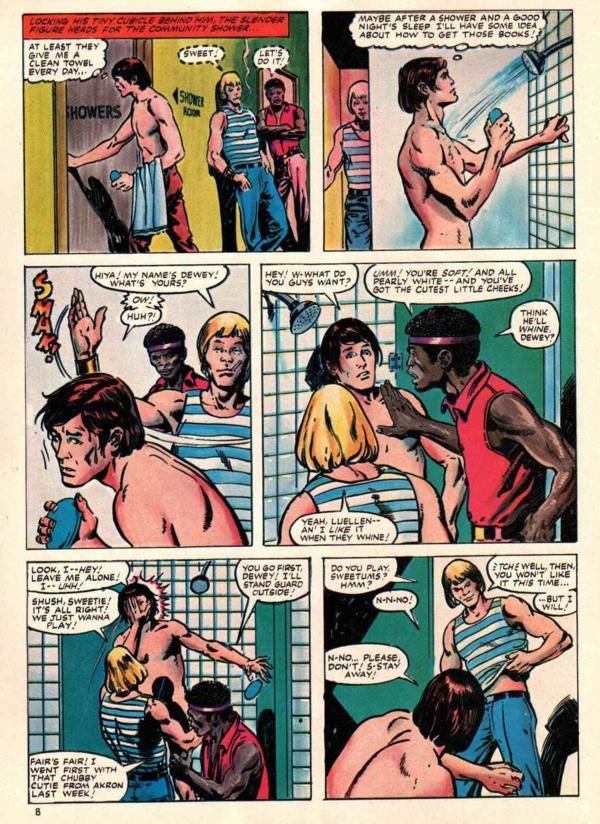Going to be a short one this week, because we are rapidly closing in on the Emerald City Comic-Con up here in Seattle, which means that I am frantically trying to get enough of my students' giveaway ashcan zines printed to get us through the show weekend. Thankfully, I have some connections in the printing industry who are willing to donate the use of their equipment, so I'm not having to do it out of Kinko's like some of the other indie publishers I've met. But I AM having to do it in short after-hours bursts, in and around the printer's actual paying jobs, at various odd hours of the evening.
So I didn't get a whole lot of reading done this week. Barely had time to swoop into the comics shop and clear the reserve box, and as I blew past the new comics I did a spit-take, because I saw a whole bunch of New Universe books.
Of ALL the things to revive.... the New Universe? Seriously? A Jim Shooter project that bombed so horribly it was the laughing-stock of the entire industry for the next couple of years? (Remember the bit in DC's "Legends" miniseries where Guy Gardner or somebody stomps a lame villain named Sunmark, a villain raving about how he's going to bring about a new universe, and just in case we didn't GET it, he's dressed just like Star Brand and bears an amazing resemblance to Jim Shooter?)
Actually, I rather liked Star Brand early on, when it was Jim Shooter and John Romita Jr. doing it. The idea behind the New Universe was kind of cool, though the execution was screwed up from day one. The premise was that one weird thing happened, the "White Event," and then everything else that came afterward would deal realistically with the various repercussions of this one fantastic impossible thing. It's known in SF circles as the 'one-gimme' school of speculative fiction.
Unfortunately, when you set six different superhero books in the same fictional universe, and have them all cross over and interact, you've already blown it. That's six gimmes right out of the gate. And they multiplied as the books went on, I think because nobody but Shooter really understood how the one-gimme idea was supposed to work. Despite the whole real-world-no-costumes mandate, the books all ended up being standard super-hero melodramas... except the first few issues of Star Brand.
Star Brand was a very odd book, kind of like the early Green Lantern might have been... that is, if young Hal Jordan had been a dumb car mechanic who just wanted to get laid, instead of a heroic jet pilot. Yet it was somehow compelling, because it seemed like this was a really personal book for Jim Shooter; the way Howard the Duck was for Steve Gerber, or the Silver Surfer was for Stan Lee. This was where Jim Shooter was determined to by God create capital-A Art in comics, Make His Statement. At least, that's what it felt like.
But the weird thing was that the 'statement' of Star Brand was vaguely unpleasant. The themes of the book were mostly, men are jerks, women are clingy, money talks, and foreigners should die. The book was deeply personal, but the person just wasn't someone we wanted to get to know.
Star Brand -- the REAL one, which is to say the deeply personal Jim Shooter one, didn't last. Shooter left Marvel, or Marvel left him, or whatever, and John Byrne made it his business to dismantle everything Shooter had set up in the book when he took it over.
Star Brand, as hypnotically unpleasant as it was, wasn't the most famous bit of Shooter nastiness, though. That honor has to go to the time Bruce Banner got accosted at the YMCA. Think the Identity Crisis rape controversy was something? You should have seen the way Shooter's characterization of gay men cruising the showers at the Y lit comics fans on fire. This was before the internet, so they got mad enough to bury Marvel in actual paper letters. It was all over The Comics Journal for months.
As it happens, I got this issue in the mail a couple of days ago -- eBay again, alert readers will recall that collecting the Marvel magazine line is a hobby of mine -- and it was the first time I'd seen the story in twenty-five years.
The Hulk's magazine had always been a bit of a problem child, even for a magazine line that was itself something of an unwanted branch of the Marvel family. For the first nine issues it was black-and-white, went under the title The Rampaging Hulk! and it purported to give us untold tales of the Hulk's early years. (I think this was all retconned out later, with some lame excuse about how these stories were just movies an alien artist made or something.) The stories themselves seemed a little off somehow. Doug Moench, the go-to scripter guy for the magazine line, tried hard, but you could never quite tell if the stories were meant to be serious or funny or both. Mostly they were just odd. The art was by Walt Simonson but you could hardly tell, the pencils were so smothered by Alfredo Alcala.
Then came Bill Bixby and Lou Ferrigno, and suddenly the magazine was in full-color, now called just The Hulk! and featured stories in more or less the same style as the TV show: lots of Banner getting involved in people's lives, not too much Hulk, Bruce on the road again at the end of each issue. You could almost hear that lonely piano music rising as you got to the last page of the story.
As Hulk versions go this was actually pretty good. I really liked the TV show (laugh all you like, gamma purists -- it's the biggest mass-market success the big green guy ever had) and I enjoyed seeing it reflected in these comics, after a fashion.
But Shooter felt that the magazine was still too comic-booky, not 'real' enough. The structure was the same as the show but the things happening to Banner were too fantastic. So he decided the easiest way to demonstrate what he wanted was to write one himself. He wrote "A Very Personal Hell" for #23, and ironically enough, a kind of hell did break loose, mostly from the gay readership. Shooter vainly tried to defend the whole thing by complaining that he didn't see why anyone would be offended because he showed two gay men as rapists, it wasn't about being gay it was about rape, and "if I offended rapists, I'm GLAD."
It dawned on me, rereading it again last week, that "A Very Personal Hell" had exactly the same vibe Star Brand had in its early issues a few years later. This was Jim Shooter trying to Say Something. This was his one-gimme Hulk story -- with the Hulk himself as the "gimme." Everyone else in it, he claimed virtuously at the time of the controversy, was based on a real person he knew or had met. Well, if that's true, then everyone Shooter ever knew is either a creepy predator or a spineless victim.
The funny thing was, as ham-handed as the story is, and as clumsy as his impatient arguments defending it were at the time, Jim Shooter was right -- he DIDN'T single out gay people, because if you actually read this story, you can see there's lots of contempt for humanity to go around. There's not just the two lisping leering shower rapists; there's also the evil manipulative mother, the worthless stoner chick, the abusive boyfriend, the wimpy suicidal woman. Victim or predator, either-or, nothing in between. Eat or be eaten. The Shooter philosophy.
I know nothing about Jim Shooter, never met the guy (though my friend Kurt Mitchell likes to tell the story of showing his portfolio to Shooter at San Diego one year, and how he got one of the best art lessons he'd ever had when Shooter spent forty minutes patiently, but ruthlessly, dissecting the work.) For all I know Jim Shooter may be the sweetest guy in the world, and never mind his press. Most of that came with the job. The editor-in-chief of Marvel always gets yelled at by the fan press, it's what we do. I admit it. But whatever Jim Shooter is like as a person, as a writer there's something unsettling about his most personal works. Like Star Brand, "A Very Personal Hell" has that same vaguely unpleasant fascination, an emotional train wreck you can't look away from.
All that being said, having had the intervening two and a half decades to calm down about the whole gay rape thing (and let's face it, in the wake of stories like Identity Crisis it seems almost quaint) I decided that I kind of like this story, despite everything. It's sort of Bill Bixby's David Banner trapped in the middle of an Aaron Spelling rewrite of "Who's Afraid of Virginia Woolf?" until Lou Ferrigno's Hulk shows up and smashes everything. And come on, who wouldn't stand in line for THAT play?
See you next week.


